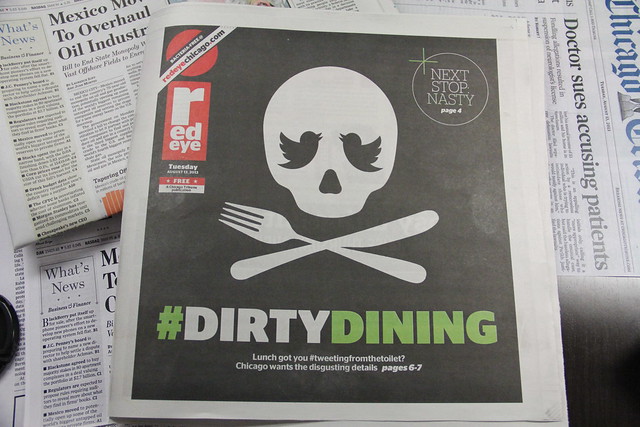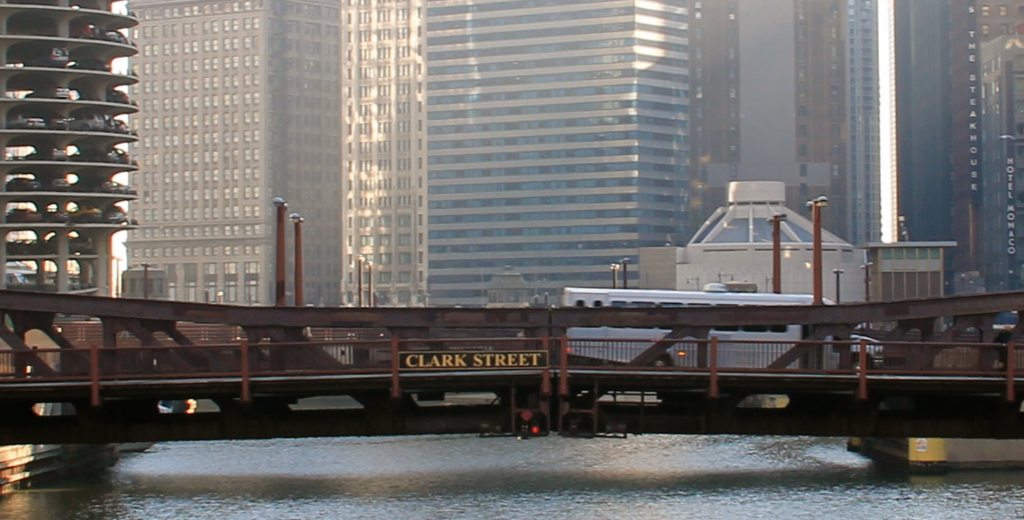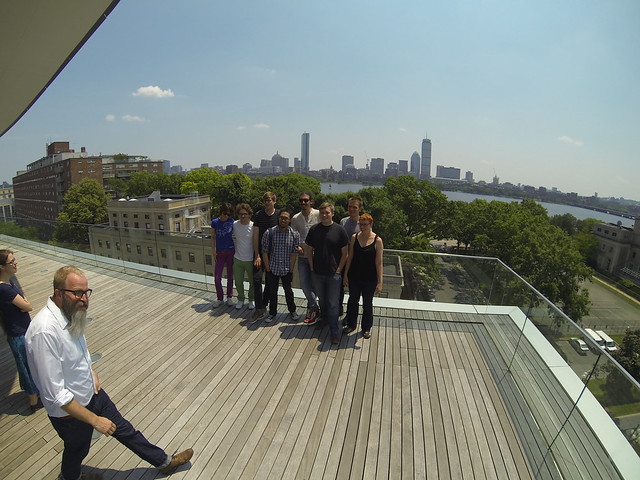Work
Foodborne Chicago and Flooding the Box
It was interesting to see on Twitter a discussion started when Foodborne Chicago was clumped with the Boston’s Streetbump app. I jumped in a bit, but I’m not much of a Twitter convo person, as I use it more to make art (first tweet!) than anything else. So I thought it write a bit about our conceptual models for creating software.
First off, at Smart Chicago we have a software philosophy:
We believe in making the smallest amount of software to be useful to the largest amount of people in connecting residents to their government, their institutions, and each other.
In the longer explication of that philosophy, we have this:
It also means that we acknowledge and use the immense World Wide Web for what it is, rather than what part we own. An example of this is Foodborne Chicago, where, instead of making a new place for people to post messages about food poisoning, we go to the place where people are already talking about it.
I really wish that more developers published their philosophy of software. It helps guide things, and helps us understand that when we make things, we aren’t just publishing code to be forked, but models to be emulated and improved upon.
Flooding the box
One of my favorite conceptual models for software is “flood the box”. Flooding the box for us means making it easier for regular residents to kick off an official process.
Expunge.io floods the box for the long and complicated juvenile records expungement process. Foodborne Chicago floods the box for the process of investigating possible instances of food poisoning.
In each instance, there are many other routes to the “box”. Our goal is to use the smallest amount of software to connect more people to those processes, to those boxes.
If someone chooses to call 311, which they do hundreds of thousands times per year (take a look at the staffing plans, call volume per shift, efficiency rates, and other stats here), they can do that. If they saw something in the paper and it stimulates a service request through the Open 311 system in Foodborne, that works, too. More routes to the box.
Then the CUTGroup comes in. We watch what happens as people use the software we made. We design tests to elicit feedback on what we see are the current flaws in our system, and we talk with people in public libraries and computer centers all over the city.
Then we look honestly and directly at the results. We use qualitative & quantitative data and we make changes to our software in order to increase our effectiveness at direct connections between people who need help and the people who can help them.
Moar
In the context of our Knight Foundation deep dive project, we are working on new models for working directly with real residents, wherever they are, to find new boxes, and new floods. Always open.
Here’s analysis from our Foodborne Chicago CUTGroup test. It includes 74 pages of raw data and the complete text of every response from all 17 testers. As an aside, 71% of our 840 CUTGroup testers— drawn from every ward in the city— answered “yes” to the question, “have you ever called 311?”.
Sometimes its the simplest things. And always we find value in the process. When coupled with our software philosophy and sound conceptual models, it leads to work with integrity. More to come!
Daniel X. O’Neil Speech at City Club
I spoke at City Club on Monday, September 8, 2014. Here’s a video:
Daniel X. O’Neil, Executive Director, Smart Chicago Collaborative from City Club of Chicago on Vimeo.
Here’s the slides:
Great Post on the Data-Smart City Solutions Blog on the Meaning of the Chicago School of Data
Sean Thornton has a great post this morning on the Ash Center at Harvard Kennedy School Data-Smart City Solutions Blog: The Chicago School of Data: Building a Framework for Chicago’s Data Ecosystem. Here’s a snip:
There’s the Chicago school of architecture, made famous by Daniel Burnham and Louis Sullivan. The Chicago school of economics, led by Milton Friedman and other economists, has been a highly influential body of thought for decades. The Chicago school of sociology, meanwhile, led by George Herbert Meade and Jane Addams, ushered in modern urban sociological study.
Of course, these disciplines, styles and approaches have little in common other than being developed in Chicago. They were also all largely developed in the 20th century, and are all alive and well today.
The Chicago School of Data is less of an academic discipline and more of a method for cooperative, data-driven progress united by one key principle—that data, as public good, is one that is at the service of all people, not a select few or special interests. Moreover, that cooperative method doesn’t require its players to be major organizations or government bodies; any resident who uses data or works to improve lives is a part of the Chicago School of Data.
This is the best explication of the phrase I’ve heard yet. Bonus: my pic!
Foodborne Chicago on MeatPoultry.com: EXCLUSIVE: Foodborne illness in the age of Twitter
Here’s an article in a leading industry magazine about Foodborne Chicago. Snip:
An added benefit for public health agencies is that FoodBorne Chicago is an open-source framework, which will enable other health departments adopt the application free of charge, Harris said. Richardson said the cost of developing the FoodBorne Chicago program was “minimal between staff time and a few nominal costs for the server, the URL and things like that.”
Funding Civic Technology | Data-Smart City Solutions
Funding Civic Technology: A Look at the SmartChicago Collaborative Mode
Read here. Snip:
Such operations show how SmartChicago’s model depends on each founding partner’s unique assets. DoIT, in addition to its federally-funded initiatives, provides a wealth of city data via its open data portal that fuels SmartChicago’s civic tech projects. As host for the organization, CCT provides a home and community-driven pulpit for SmartChicago. MacArthur, meanwhile, sustains crucial SmartChicago initiatives and investments that help create and maintain a strong civic tech network.
Join Your Colleagues as an Admin of Connect Chicago
One of our favorite programs here is Connect Chicago, the meetups we hold that help create a community of shared learning in the hundreds of public computer centers and community technology centers here in Chicago. Consider joining!
The Connect Chicago website is a listing of more than 250 places in Chicago where you can use a computer for free. If you work at one of these locations, you can sign up to be an admin for your page.
Here’s a list of all admins to date— 58 out of 260 locations and counting!
A Knock At Midnight
Altgeld Library
Archer Heights Library
ARK of St. Sabina
Arturo Velasquez Institute (AVI)
Association House of Chicago
Auburn Gresham Senior Satellite Center
Back of the Yards Neighborhood Council CTC
Bezazian Library
Breakthrough Urban Ministries
Bucktown-Wicker Park Library
Catholic Bishop of Chicago/St. Sabina ERC
Center for Changing Lives
Center of Higher Development – Lake Grove
Center of Higher Development – Magnolia
Center on Halsted
Charles Hayes Center
Chatham Business Association, Small Business Development, Inc.
Chicago Commons ETC
Community Job Training and Education Center
Community Job Training and Education Center
Douglass Library
Edgewater Library
Garfield Ridge Satellite Senior Center
Goodwill Industries Job Training Center
Greater Southwest Development Corporation
Harold Washington Library-HWLC
Howard Area Community Center
Indo-American Center
Industrial Council of Nearwest Chicago (ICNC) Community Technology Center
Instituto Del Progreso
Jane Addams Resource Corporation
Kelly Hall YMCA
Kennedy-King College
Kennedy-King College
Lake Parc Place
Little Village Library
Lumity
Malcolm X College
Mather’s-More Than a Café (Higgins)
Mercy Housing- South Loop
Onward Neighborhood House
NEBC ( neighborhood empowerment for a better community )
Poder Learning Center
Renaissance Court at the Chicago Cultural Center
Roosevelt Library
Second Sense Beyond Vision Loss Technology Center (Access limited to people with vision loss)
SER Central States Little Village Center
GSDC Southwest REACH Center
Spanish Coalition for Housing
Spanish Coalition for Housing
Street-Level Youth Media Center
The Cara Program (West Loop Campus)
Metropolitan Family Services 63rd Street Corridor Center for Working Families
Metropolitan Family Services 63rd Street Corridor Center for Working Families
The Renaissance Collaborative
Whitney M. Young, Jr. Library
YWCA Parks Francis Community Technology Center
Deadline for Knight-Mozilla Fellows closing fast!
We’re big fans of the Knight-Mozilla News Fellows. For ten months, the fellows are embedded in newsrooms like the New York Times, Texas Tribune, ProPublica, and the Washington Post bringing their technology skills to the front lines of journalism.
So, with that in mind – we’re encouraging developers, designers, data scientists and all around do-gooders to apply for the Knight-Mozilla Fellowship.
We have more details about the program below the fold. You can get the full story on the OpenNews website here.
First CfA Regional Brigade Housed at Smart Chicago
Midwest Selected for Code for America Brigade Regional Pilot, on the Code for America blog.
Free LibreOffice Training
15 free, downloadable courses in word processing, presentations, and spreadsheets over on Connect Chicago.


